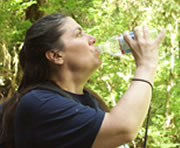|
on
safety |
 |
| Navigation: The
guidebook's directions should be read carefully,
but paying attention to the way you came and when
there is any doubt marking it is the best way to
find your way back. |
| Since getting lost is always a possibility,
prepare by bringing a flashlight, warm clothing extra
water and snacks |
|
Steep
Trails: This is known as elevation gain in the hiking guidebooks.It
is a factor to consider when choosing hikes. In the words of my physical
therapist, if you want to do hills, you've got to train hills.
|
I
find climbing very strenuous and in some situations it can be difficult to
keep up with others in the party. My hiking partner is very kind and encouraging
when I struggle with elevation gain and so I've always made it to the top.
What I've learned from him is that it's better to keep moving forward, however
slowly than to stop and sit. Another trick is to count your footsteps. I
finally learned to count past sixty nine in French by counting my steps up
a long hill. Other than that, just remember, "It ain't nothing".
|
|
|
| Hydration: Clean fresh
water is essential hiking equipment; minimally, I bring
enough for 8 oz per hour per person. It's tempting to
reduce the amount in order to lighten the pack but it's
not the right approach because maintaining a steady consumption
of water keeps us comfortable and makes the hike more
enjoyable. |
| There are other ways to stay hydrated and refreshed.
Steve and I bring sliced fruit such as grapes or orange
wedges. Sports drinks are also good supplements to water
but water is the most important refresher to bring along. |
| Mosquitos or Flies: A
light application of a mosquito repellant with DEET can
make a hike much more pleasant. An alternative to bug
repellant is "Skin So Soft" by Avon. |
| Sun Protection: The sun
has a bad reputation because over-exposure can lead to
sun stroke, wrinkles and skin cancer. On the other hand
being outside in natural light is becoming recognized
as a natural anti-depressant. I think the best approach
is to spend as much time outdoors as I can reasonably
manage and protect my skin with sunscreen. I don't do
strenuous hikes in the sun when temperatures are higher
than I am accustomed to and when overheated, I find shade
and stay hydrated. I rarely wear hats but they also provide
protection that allows the wearer to get the best effects
of sunshine and outdoor exercise. |
| Cliffs, ledges, and waterfalls: At
the tops of cliffs that have no fences or barricades it's common
to hear one hiker ask another if anyone has ever fallen. Often someone
will tell a story of a hiker who died in a fall from that cliff.
It happens. Pay attention to your location and to your footing and
don't take risks. |
| by Dianne Bengtson |
| photography by Steve Robertson |
|
|
|